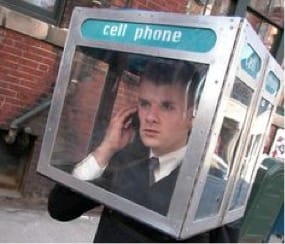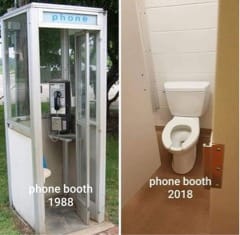“Phone” comes from the Greek for sound or voice.
As an executive and advisor trying to help manage dozens of companies at once, I’m constantly on the phone and in motion, in airports, on the run, etc. Professionalism and “Elevating the Way Business Does Business” is the driver of our mission, vision and values. We couldn’t do it without phones.
Well, landlines died. Smartphones took over. Web based ZOOM calls proliferated. I predicted in a report I was hired to write for Microsoft in 2005 that the smartphone would be the center of our universe. I went on to help invent reservationless conference calling, helped build the first streaming media site for remote learning and touched on so many other forms of communication since the internet was born.
Many younger Americans use cell phones as their only phone. Yet, as we’ve found, younger people don’t use phones as phones. They text, Slack, email. Getting a young person on the phone is often as hard as getting Genghis Khan to show up to a seance.
We should consider that maybe young people don’t talk on the phone because cell phones suck at just one thing:
Being phones.
When it comes to the reason phones exist—phoning—phones today are awful compared to phones from 50 years ago.
And it’s ruining business. If the Romans had tried to build their empire over a mobile phone, the Barbarians would have eaten their lunch. If the Iroquois had built their Great League of Peace over speakerphone, it would’ve been called the Great League of Missed Messages.
There are three main reasons phones suck at phoning.
Phone hardware is crap. Cell phone speakers and microphones are designed for looks rather than acoustics. The small, tiny speakers are crammed into tiny slots to make room for batteries and gyroscopes. Phones shouldn’t be called phones, they should be called Mini-Computers or Pocket Tablets.
Networks are jenky. Wireless networks have dead spots all over. My calls are dropped all day. Voices fade in and out. You get sudden bursts of sound followed by silence. Wireless networks seem to have been designed by shut-ins who’d rather play Candy Crush than talk to real people.
The death of the idea that cell phone calls should be private.
It’s hard to remember, but before cubicles and WeWork, people took phone calls in private. They had private offices where the door closed. Houses had private phone rooms. Even out in the world, hotels and restaurants had private cubbies and phone booths.
You walked away from your lunch. You settled in. You phoned.
You held your body still. Put your focus on the person on the other end. You bathed in their words, you luxuriated in their tones. You could hear a fly buzz.
No more. Life today is crazy. We’re all economically squeezed, so we feel like we have to multitask. So we take our calls in the mall, on the street, at our kids’ playground.

On-the-go, distracted calling sucks for everybody. The signal to noise ratio is terrible. We’re missing each other. No wonder one out of every three Americans say they’re lonely.
Phone calls are especially rough for folks with hearing issues.
Like many people, my hearing isn’t perfect. I suffer from a rare disorder called hyperacusis, which distorts the way I perceive sounds. I have a harder time suppressing background noise and distinguishing speech. For me, little noises that don’t bother other people sound excruciating. I hear shallow voices in echo-y rooms as a painful cacophony.
If phone calls are not clear, it literally hurts. Typing on a keyboard sounds like the clatter of pots and pans dropped in a kitchen. A loud cafe sounds like nails on a chalkboard. Phone calls that have barking dogs, car engines, passing ambulances, vacuum cleaners, or even chewing gum—these hit my ear drums like cheese graters. I have a physical reaction, like an ice cream headache. I get anxiety. They borderline give me a panic attack. I sometimes rip my bluetooth out of my ear. I ask God to quiet my world before I lose my mind
My asks for, me your business and your family and friends
So: friends, associates, employees—if you’re still reading—I have some asks: please, elevate the way your phone makes phone calls. Do this for everyone in your ecosystem
First: Talk to me on a landline if you can!
I realize asking for a landline call is like asking you to send me smoke signals or letters via the Pony Express.
But if you have a landline, use it, willya?
2nd: Use the best mobile phone tech you can.
If you can’t talk on a landline, let’s try to get as close as we can to that landline sound.
- Please don’t put me on speakerphone. Or take my phone calls on your Apple Watch or car bluetooth. Car speakerphones are increasingly worse and worse.
- Adjust your audio settings on your phones. Here’s instructions for the iPhone, Google Meet and Zoom.
Please use a premium wireless office headset, in and out of the office and home.
You may think your expensive AirPods, or Boses cancel noise and sound clear. Not to me, nor millions of others . Talking to me on a normal headset with any kind of background noise is like yelling at a baby. And, moreover, it’s rude.
A Poly headset does the best job of mimicking landlines. Here are my favorites:
- Voyager 5200. For out and about.
- Savi 7-series. In your home or office.
Other great headsets are reviewed here. (If you work for me, I’ll probably reimburse you.) You may think you are woke as you are using the newest AirPods, yet while they are twice as good as the last ones, they are not professional by any means.
The most important thing about headsets is to find a quality microphone. Since most headphones are built primarily for listening to music, not talking, mics aren’t always a priority. Find a mic with a high “knee point,” around 40 decibels. Human speech starts around 55 decibels, so a mic that doesn’t pick up sounds below 40 decibels—its “knee point”—will filter out shuffling papers or keyboard clacking.
Please, always have a backup headset or two. Redundancy is a GREAT thing.
Overall, try to increase professionalism. Increase clarity. Get your point across. Otherwise, we end up like the famous “BBC Dad.”
Children interrupt BBC News interview – BBC News
I love that little kid bouncing into his dad’s BBC interview. I love kids. I love pets. Yet kids and pets can’t contribute to business calls. Their brains are too small for profit and loss statements.
Second: Try to recreate the old phone booth.
If you can, think of the old days. Remember what it was like to talk in a phone booth or a private office. Close the door.
Try dampening your office. Hang up artwork that’s more sound absorbing. Soften hard surfaces.
Please don’t:
- Call me from the grocery store, gas station, or park.
- Walk around your house, doing the dishes, loading the laundry, opening or closing cabinets or doors, crinkling paper.
- Be too close to a running washing machine or dishwasher.
- Type on your keyboard too loudly. Get a quieter keyboard. Here’s a great one.

Clear communication is a big deal
I’m asking my friends to try for the highest signal-to-noise ratio possible. However you can do that.
We need to speak clearly and understand each other. We’re trying to connect, build, expand the pie. We want to create institutions and vast wealth our grandchildren will be proud of.
Elevating the Way Business Does Business is my company’s motto. Elevation includes everything from ESG metrics to measuring carbon to Indigenous Reciprocity to efficiency in data centers.
We can get the boring old phone call down to a science. Together, we can Elevate the Way Phone Calls do Phone Calls.










